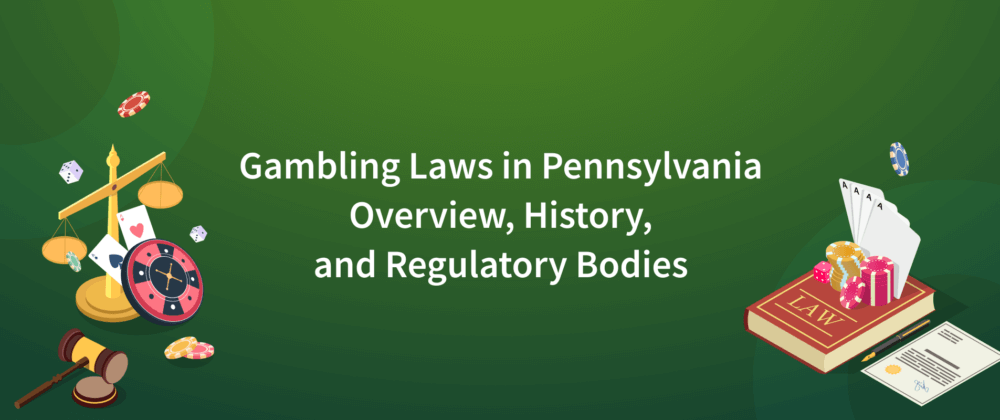Pennsylvania legalized lottery games. In 1972, the state sold the first lottery ticket. In the first six months after lotteries were legalized, four participants won the $1,000,000.00 jackpot each.
Pennsylvania Gambling Law: Is Gambling Legal in PA?

 1.3K
1.3K

Is gambling legal in Pennsylvania? All forms of gambling used to be considered illegal, but the laws have evolved allowing more establishments to provide consumers with chance-based games. Over the years, the PA Gaming Control Board has carefully crafted a framework that allows certain types of gambling while maintaining strict regulations to ensure responsible gaming practices.
Pennsylvania has emerged as a progressive state when it comes to online gambling. It recognizes the industry evolution and took a proactive approach in legalizing iGaming. This significant development gives more opportunities for players and providers alike to access or offer virtual casino experiences. Let’s dive deeper into Pennsylvania Gambling Laws to understand all restrictions and legal gambling in the state.
What Types of Gambling are Legal in Pennsylvania?
Here’s the list of legal types of gambling activities in Pennsylvania:
- Brick-and-mortar casinos;
- Online casinos;
- Sports betting (both in-person and online);
- Video poker;
- Keno;
- Bingo;
- Poker rooms;
- Lottery.
Pennsylvania passed House Bill 271, significantly changing how Pennsylvania gaming laws regulate and oversee its gambling landscape. The new law gives more ways to gaming opportunities by introducing different types of casino licenses. The main categories are racetracks, standalone, resort, and ancillary casinos.
Racetrack facilities will have to fulfill a licensing fee of $50 million to claim the license. Operators must renew their licenses every three years, and racetrack facilities must be more than 20 miles from each other. Operators running racetracks must have held a license for conducting thoroughbred or harness racing with pari-mutuel wagering. Racetracks can offer table games by paying a fee of $16.5 million after acquiring a slot machine license.
Standalone casinos can acquire category two licenses to operate slot machines. All standalone casino applicants must be eligible as a category one applicant (racetrack license). The applicant must build the casino facility in a different city from another standalone facility. If a nearby racetrack has conducted more than 200 racing days per year or two consecutive years, the standalone casino must be at least 30 miles away from it. Like racetrack facilities, standalone casinos can offer table games by paying a fee of $24.75 million.
Resort casinos can claim a PA gaming license for operating slot machines with an initial fee of $5 million. However, the applicant must not have applied for a racetrack or standalone license. The casino must be within a well-established resort hotel with at least 275 guest rooms and recreational amenities. The applicant must either be the owner of the resort or a wholly-owned subsidiary of the owner.
The Pennsylvania Gaming Control Board can auction up to ten licenses for mini-casinos. The category four license applies to casinos with at least 300 slots, up to 750 machines, and 40 table games. If the operator has acquired a license in other jurisdictions, they must submit a letter of reference from the licensing body of that jurisdiction. The letter should contain the applicant’s gaming associations, operations, and past experiences.
All qualified gaming establishments in Pennsylvania can offer online gambling by applying for Interactive Gaming Certificates. The fee differs depending on the timing of the application and the casino’s virtual entertainment. Unlike land-based licenses, Interactive Gaming Certificates operators must renew the application every five years.
Legal Definitions of Gambling in Pennsylvania
PA gambling law doesn’t provide specific definitions for gambling. However, the state’s courts have embraced the traditional definition of gambling: consideration, chance, and reward.
- Consideration is a value that one offers to participate in an activity. Regarding gambling, consideration often refers to money of any form which players’ put down as stakes. It includes any currency, including virtual currencies like crypto. Any items equivalent to cash, like gift cards, also qualify as consideration;
- A reward is the opposite of consideration. Although it also means anything of value, a reward is something one can receive after winning their bet. Like consideration, reward can be anything of value, including objects, virtual objects, trips, a right, and more;
- Chance is an unpredictable random event that can lead to the winning of any party. It must be something that participants can’t control. For example, when a player draws a card from a shuffled deck, there’s a random chance of outcome. Although some casino games require skill to win, there’s still some randomness to the gameplay.
Pennsylvania Gambling Regulatory Bodies

The Pennsylvania Gaming Control Board (PGCB) is the regulatory body that oversees all gambling activities and betting operators across the state. When applicants want to acquire a license, they must get approval from the PGCB. The PA Gambling Control Board will run various checks to ensure the applicants haven’t committed gaming offenses before applying.
All license holders will be monitored and checked for any potential violations of Pennsylvania casino laws. The board monitors slot machine operations, the integrity of gaming, internal controls, and security quality. The investigation will include underage gaming and drinking and resolve complaints, if any. The board must be present to inspect and examine land-based operations if the establishment offers slot machines. They will check the establishment and the machine manufacturers to ensure compliance with the act.
The Board might deny the applicant’s requests and license renewal if the applicant fails to prove they’re qualified to offer their services. If the applicant refuses to provide their documents for a background check, the Board can turn down their requests. The same applies to withdrawal requests towards the Board.
Pennsylvania Gaming Control Board regulations include gaming equipment manufacturers. Manufacturers may request a license and will undergo the same inspection.
Is Online Gambling Legal in Pennsylvania?
Is online gambling legal in Pennsylvania? The state doesn’t provide any ruling on online gambling. However, online sports betting is legal due to the Expanded Gaming Act and the US Supreme Court of 2018 judgment. The law permits betting by any method or system, which states that betting virtually is legal.
Pennsylvania doesn’t classify online casinos separately. However, the Expanded Gaming Act of 2017 includes online slots, poker, and table games in its legalization. The state allows 39 licenses for online gaming for slot machines, poker, and table games. When the PGCB opens for application, applicants can apply for individual gaming licenses for each category.
At the online gaming application deadline 2018, nine casinos in PA submitted their applications. As of 2023, 20 PA online casinos offer gambling to Pennsylvania players.
Pennsylvania provides a state lottery, which the law doesn’t define clearly. However, the state legalized online lottery in 2017. In 2019, PA iLottery was launched under the state lottery commission.
Legal Gambling Age in Pennsylvania
The legal age for gambling in Pennsylvania for any casino is 21. This applies to both online and land-based casinos in Pennsylvania. However, 18-year-old players can participate in pari-mutuel betting, bingo, lottery, and Daily Fantasy Sports.
PA gambling laws also separate gambling age legality based on the game type. Sports betting, online and land-based, require participants to be at least 21. Online casinos, including poker and land-based poker rooms, also have a minimum gambling age 21. On the other hand, bingo, lottery, Daily Fantasy Sports, and Horse Races or Pari-Mutuel allow 18-year-old participants to join. Read our article on legal gambling age in Pennsylvania to learn more.
Responsible Gambling in Pennsylvania
Pennsylvania regulates land-based casinos in terms of alcohol consumption in the establishment. All casinos must include a procedure preventing employees from serving alcohol to intoxicated customers in the training program.
Operators can place advertisements on the gaming equipment. However, it mustn’t contain any misleading information. Operators shouldn’t employ anyone to persuade customers to place bets or play a specific game or machine. Any advertisement must remind customers about responsible gambling, including a helpline number.
For approval, the PGCB requires slot machine manufacturers to submit signs to the Office of Compulsive and Problem Gambling. The signs should contain information on how customers can find assistance if they have gambling problems. The licensee must clearly state where they got the information about the gambling problem resolutions before getting approval.
Players in Pennsylvania can request self-exclusion to the state for one year, five years, or indefinitely. When a customer files a self-exclusion request, the establishment must exclude the customer until the request expires and deny offering gaming privileges. Read more about self-exclusion in Pennsylvania in our blog.
Legal Gambling Timeline in Pennsylvania
Check out some of the most important years in the development of legal gambling landscape in the Keystone State. Check out our comprehensive guide to history of gambling in Pennsylvania to see the bigger picture.
1971
1981
The Pennsylvania Bingo Law was launched, legalizing fundraising bingo events. However, bingo wasn’t the only game allowed by the new law. The Pennsylvania Local Option Small Games of Chance Act extended the bingo law in 1988. The extension will enable organizations to host small luck-based games legally, including raffles, punchboards, pull tabs, pools, and draws.
2004
Racetracks were the first gambling act ever legalized in Pennsylvania gambling laws. However, in the early 2000s, they struggled to stay in business. The Pennsylvania Race Horse Development and Gaming Act was then made to allow racetracks to offer slot machines. This leads to the appearance of multiple standalone casinos and casino resorts.
2010
Due to popular demands, a bill was signed for the state to permit table games in casinos in 2010. The table games include roulette, blackjack, poker, baccarat, craps, and more.
2017
In late 2017, the Satellite Casino and Truck Stop Bill was passed. The bill allowed truck stops and international airports to offer slot machines. It also legalized online gambling. The new law was made due to multiple illegal operations of online casinos. With the Pennsylvania Gaming Control Board regulating online casinos, customers can enjoy online gambling safely.
2019
First online casino enters the state. Even though PA gambling laws allowed online gambling in 2017, it wasn’t until 2019 that the first casino website was launched. PlaySugarHouse was the pioneer of the Pennsylvania gambling scene, with many more casinos being launched after that.
FAQ
Can 18-Year-Old Customers Visit Casinos in Pennsylvania?
No. Pennsylvania gambling age is 21. This applies to all casinos in Pennsylvania, land-based and online. However, several games allow 18-year-old customers to participate. For bingo, lottery, Daily Fantasy Sports, and Pari-Mutuel betting gambling age in PA is 18 years old.
Who Regulates Gambling Activities in PA?
The Pennsylvania Gaming Control Board oversees all gambling in PA. The regulatory body grants licenses and monitors all casinos’ activities to ensure they comply with the Pennsylvania gambling laws and provide honest services.
Is Online Gambling Legal in Pennsylvania?
With the extension of the Gaming Act, online gambling is legal in Pennsylvania. It includes online sports betting and online casino games for of-age Pennsylvania players. So, is gambling legal in PA online casinos? Definitely yes.
Does Pennsylvania Tax Gambling Winnings?
PA gambling tax is 24% on all gambling and an additional 3.07% income tax rate.
When did online gambling become legal in Pennsylvania?
Legal online gambling in PA has existed since 2017, when the Pennsylvania Gambling Expansion Act was signed into law by Governor Tom Wolf.
Is sports betting legal in Pennsylvania?
Yes, according to gambling regulation in Pennsylvania, you can place bets on a wide range of sports and events at licensed sportsbooks, both in-person at casinos and online through licensed sports betting apps and websites.










